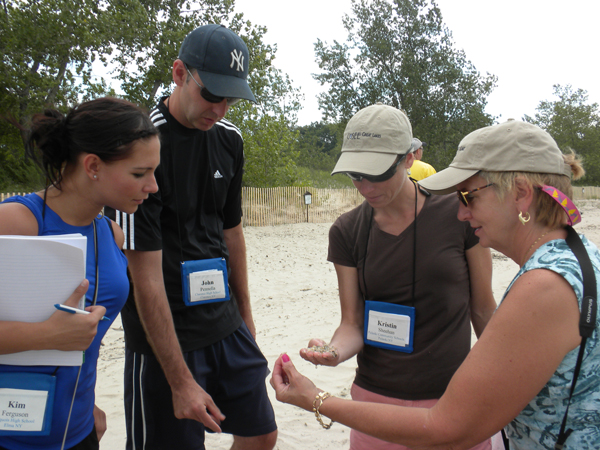Contact:
Dave White, New York Sea Grant, Recreation/Tourism Specialist, P: 315.312.3042, E: dgw9@cornell.edu
Helen Domske, Senior Coastal Education Specialist, New York Sea Grant P: 716-645-3610, E: hmd4@cornell.edu
July 23-26 Lake Ontario Workshop Offers Field Experience Learning Opportunity for Teachers
June 22, 2012, Oswego, NY - Teachers and watershed educators are being invited to register for the July 23-26, 2012 Great Lakes Lake Ontario Field Experiences Workshop that also includes learning opportunities on Oneida Lake.
New York Sea Grant Coastal Education Specialist Helen Domske, an award-winning instructor who has trained hundreds of teachers and youth educators about the Great Lakes ecosystem, leads the four-day workshop. Participants in past summer workshops have represented schools and youth programs from across New York State and other states.
“The workshop agenda is designed to provide teachers with new ways of inspiring students with meaningful watershed educational experiences. This summer program offers those experiences to the teachers themselves using five curricula developed by NOAA (National Oceanic and Atmospheric Administration),” Domske says.
The five curricula cover a learning cycle with modules titled Excite, Explore, Explain, Elaborate, and Evaluate and use the STEM: science, technology, engineering and math educational method.
Participants will have the opportunity to learn from Cornell University researchers, New York State Department of Environmental Conservation (NYSDEC) and U.S. Geological Survey (USGS) biologists, and New York Sea Grant Dune Specialist Mary Penney.
Workshop venues include SUNY Oswego, the H. Lee White Marine Museum and USGS Lake Ontario Biological Station in Oswego; the Cornell University Biological Field Station in Bridgeport; the NYSDEC Salmon River Fish Hatchery in Altmar, and the Eastern Lake Ontario Dunes and Wetlands Area.
Participating teachers will receive a stipend to develop a Community Stewardship Project.
“Our studies will be place-based and focused on locally-relevant issues that will help the teachers develop Great Lakes literacy and stewardship projects for their own specific teaching areas. Ultimately, the goal is to develop citizens engaged in practices that value and promote a sustainable environment,” Domske adds.
One workshop participant whose students complete an exemplary Community Stewardship Project will be selected to co-present at the Science Teachers Association of New York State annual conference.
For workshop details and registration application, contact New York Sea Grant at 315-312-3042, dgw9@cornell.edu, www.nyseagrant.org/cyeducation.

New York Sea Grant Coastal Education Specialist Helen Domske (right) explains how to recognize the difference between quagga and zebra mussels to teachers Kim Ferguson of Iroquois Central School, Elma, NY; John Pennella of Clarence High School, Clarence, NY; and Kristin Sheehan of Pulaski Community Schools, Pulaski, NY, on a teacher training field trip to Black Pond Wildlife Management Area. Photo: Paul Focazio/NY Sea Grant
More Info:
New York Sea Grant (NYSG), a cooperative program of Cornell University and the State University of New York is one of 32 university-based programs under the National Sea Grant College Program (NSGCP) of the National Oceanic and Atmospheric Administration (NOAA). Through its statewide network of integrated services, NYSG has been promoting coastal vitality, environmental sustainability, and citizen awareness about the State’s marine and Great Lakes resources since 1971. For updates on New York Sea Grant activities, www.nyseagrant.org has RSS, Facebook, Twitter and YouTube links.